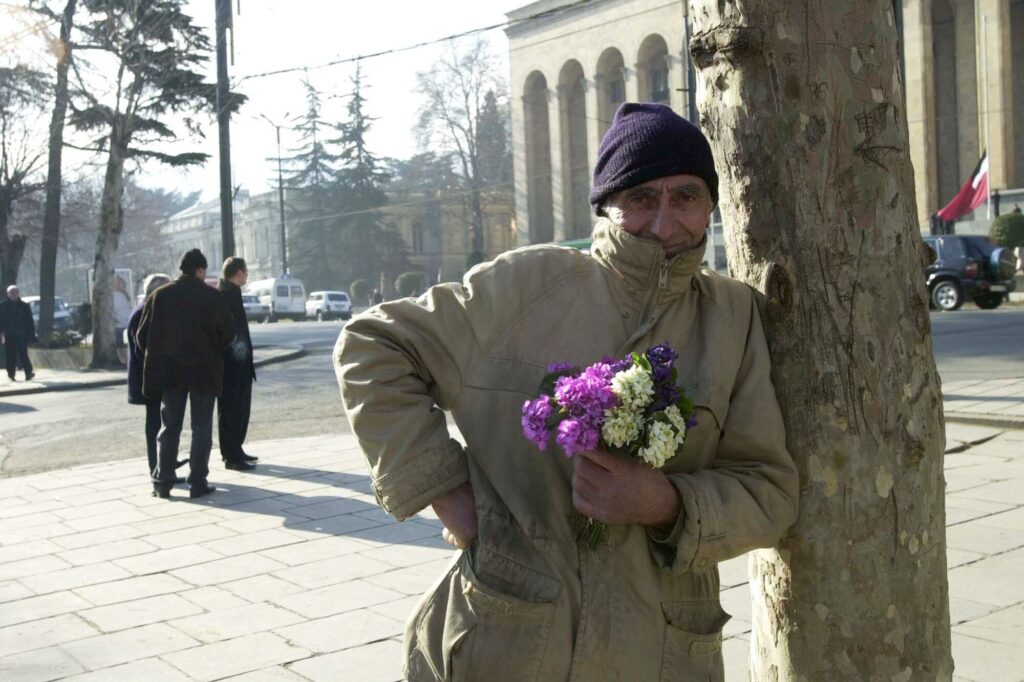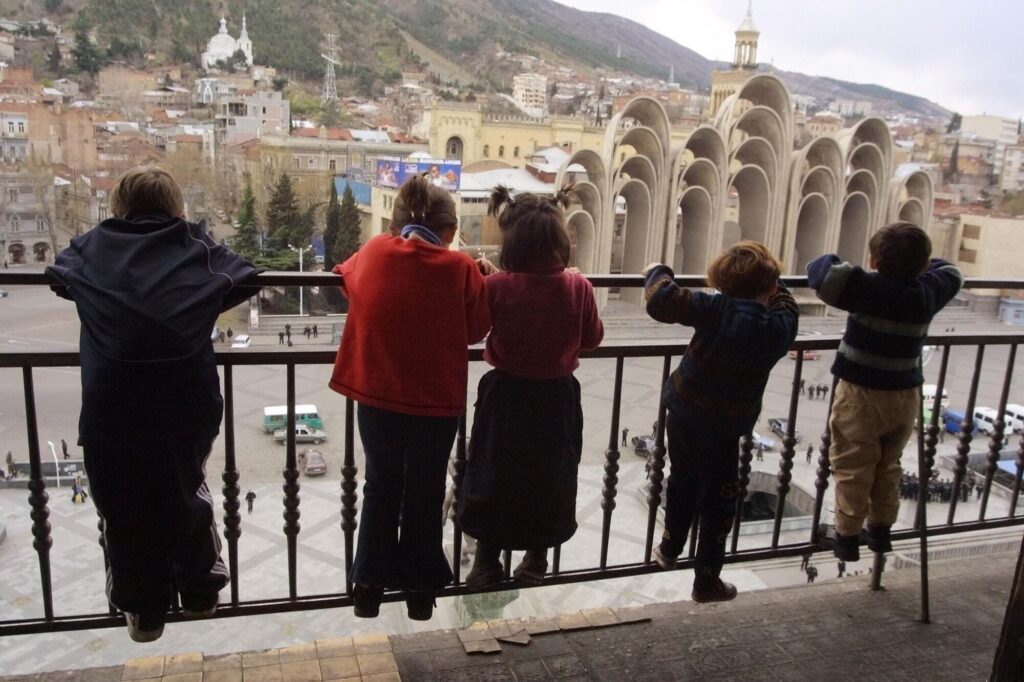Rethinking Foreign Aid (From the Inside)

In 2001, when I was in my 20s, I arrived for my first-ever internship in the picturesque, alluring, but wounded setting of the republic of Georgia. I worked on conflict prevention with the United Nations Development Programme’s Georgia office. Conflict prevention was all the rage back then. It was a kind of age of reason. There was a belief that technocratic multilateral operators could make a precise diagnosis of the causes of conflict, would swoop in and apply a set of measures to abate those causes and, voila, no conflict. Less than a decade earlier, Georgia had fought, and lost, two wars with secession-minded ethnic minority communities, which had left a legacy of mass displacement and chronic crisis of statehood. There were more regions inhabited by ethnic minorities, and the conflict prevention template demand required that they be probed for their risk of turning into another such conflict.
I, however, was as green as they come, wide-eyed with awe for international organizations’ role in peace, democratic transition and development in the former Soviet Union. My heart beat faster every time I walked into the U.N. Country House.
I had been instructed to reach out to “everyone” for my research on one of those ethnic minority regions—“everyone” meaning multilateral organizations and local NGOs. They were easy to find. Walking the crumbling streets of the central Vake district in Tbilisi, I noticed how on practically every building there were brass plaques of local NGO offices. They typically had long, ponderous names linking words like “international”, “committee”, “association”, “institute”, “democracy”, “development”, and they seemed to work primarily on researching and documenting the many problems faced by their country, outlining how they thought they should be addressed and offering themselves to take on that role, too.
In a country that veered so close to a failing state, I found conspicuous that this new, peculiar crop of social enterprises radiated energy and effectiveness and that they were already the preferred go-to partners for the same international aid organizations that were also the source of their funding.
My next internship was with an up-and-coming human rights NGO that a few short years later catapulted to the top of the political elite. I got to sit in on local NGOs drawing up campaigns to enlighten the population about women’s rights. My initial thrill of being in the thick of civil society work soon gave way to nagging questions. In one meeting I asked “how are you ensuring that this campaign will be seen by women, that it will make an actual difference in their lives?” The women around the table turned their beautiful faces towards me, their large, dark-lashed eyes wide open with incomprehension.
I left Georgia with seeds of doubt in my heart. What does the “develop” in civil society development actually mean? Is it a transitive or an intransitive verb? Does civil society develop, or do we develop it? Still, I went on to become a full-time civil society professional, working dutifully within the paradigm of international funding for grassroots civil society. I worked in Russia, Ukraine, Moldova, Central Asia and, every once in a while, Georgia. Sometimes, if rarely, I operated within the very heart of this system, as a grant-maker, in charge of large amounts of money at a foundation or a bilateral aid agency, divining who should get it, and who should work on which issues and through what kind of selection process. More often, I was at the margins, pushing and flattering foundations and diplomats in order to pry off some crumbs from the cake for activists in locations—or working on causes—that had not attracted any donors’ attention.
More than 20 years down the road, I have been asked to write a personal account set in the greater story about how we all (meaning those of us wielding Western money and thus power) “behaved inappropriately” in Georgia and elsewhere, captured politics and policy-making in poor countries and eventually “corrupted and corroded” them, in the words of a long-term philanthropist leader.
This is a story about foreign-aid and philanthropy’s role in shaping civil society sectors in the former Soviet Union during the post-Cold War period, and how foreign money and the interests it represents creeps right into policy-making, politics, democracy and ultimately sovereignty. It echoes dynamics across the entire Global South or in the very recent, barely digested, past of countries in Central and Eastern Europe. The republic of Georgia, in the news these weeks because of massive protests connected to NGOs and their foreign funding, will be the main case study. The Bildungsroman turns Brechtian here: the Georgian version of this story is so extreme, so overdrawn, that it is almost too on the nose.
Today Georgia is making global news, with the same iconography of every previous decade since the late Soviet era: large crowds of this photogenic people, their expressive features and theatrical passion, wrapped in flags (their own and those of their favored foreign patrons), facing the police on the wide boulevards of Tbilisi. They are protesting, we’re told, a law that would require NGOs receiving 20% or more of their funding from abroad to register as “representing the interests of a foreign power”. But Georgians don’t trust NGOs and care even less about them, a fact well-established over long years of polling. So those same NGOs had to persuade the public that it is a “Russian law”, which will turn Georgia into Russia and bring the country under Russian domination, ending Georgians’ most fervent dream: joining the E.U. None of this has any basis in fact, although E.U. leaders, to their discredit, have exploited Georgians’ ardent desire for E.U. membership and fueled their fears with vague threats.
Georgia’s story is exceptional, by a wide margin. The country had experienced arguably the steepest fall of any former Soviet republic upon independence. It had been the Florida of the Soviet Union—a gorgeous vacation spot that also had monopolies on producing tea, wine and citrus and thus black market income, punching above its weight in Soviet Union politics due to the acumen of its leaders, its artists (and by extension all Georgian men) enjoying a Latin lover-like allure among Soviet women. Its nationalist independence movement was one of the most fervent, carried by high hopes for an equally privileged future. Then the country fell into the abyss—two lost separatist wars, hundreds of thousands of refugees, civil war, its GDP dropped by more than half, all within a few short years.
In 1998, Ghia Nodia, a leading public intellectual, wrote a seminal essay about the role foreign patrons had played in Georgians’ visions of state-building, security and development for centuries. In the 90s, the West and its pipeline projects were expected to bring “parasitic well-being under magnanimous patronage”. Nowhere in the world did the West ever endeavor such a zealous, massive project of recreating societies in its own image as in the former Soviet Union. More than any other post-Soviet country, Georgia made an early and wholehearted decision to accept foreign funding in all its shapes and forms, with all the outlandish agendas and strings attached. If that meant relinquishing domestic policy-making control across the board to foreigners, it was no problem. In the 1990s, Georgian political elites were too feckless and corrupt, and the country too prostrate, to care about policy anyway.
That corruption and fecklessness meant that by the early 2000s, Edvard Shevardnadze, the wily former Soviet foreign minister who had led the country out of civil and separatist wars a decade earlier, was an utterly spent force in the eyes of Georgians and Western governments alike. A coalition of young former officials and NGOs (including the one I had interned with) prepared to use the 2003 elections, which Shevardnadze predictably rigged, to topple him through street protests.
In the months building up to the Rose Revolution, I witnessed how already-powerful Georgian NGOs were treated as a government in waiting by their interlocutors in the West. Around conference tables in New York and DC, the notion was normalized that once the change came, Western organizations would play a leading role in reshaping the country. There was a total absence of squeamishness about seizing a controlling stake in a foreign country and micromanaging its fate. Instead, there was rousing unanimity with the brilliant, inspired Georgian activists about what their country needed to be free, just and prosperous. We would be working hand in glove with them. How could that possibly go awry?
The zealous new crowd that took power by the 2003 Rose Revolution bought wholesale into a vision of adopting the shiny, technocratic solutions proffered by the World Bank and the E.U. of emulating the West and even outdoing it. They were true believers. They said yes not just to the money, but to the ideas and prescriptions and to outsourcing their implementation, to the market—and to NGOs.
When the Rose Revolution came, much as it had been planned, I felt uneasy. At the time, I lacked the words and ideas to express it, though I tried. I realize now that my unease came from seeing just how flattered and tickled the foundations in the U.S., think tanks in London, and E.U. offices in Brussels were by the whole thing. It was still early days in the post-Cold War period and the end of history still looked like it might be within our grasp. Here was their chance.
Surely, I thought, someone else must share this apprehension? Perhaps someone in a high place, where they ought to have cooler heads? Quite the contrary. The Rose Revolution was seen in Brussels as a fantastic opportunity. But an opportunity for whom, I wondered. They meant for the E.U. and the West, not the Georgian people. Opportunity for what? For turning a country into an experimental policy lab, like a 21st century Pygmalion might? For the early stirrings of a geopolitical E.U.? At the first post-revolution donor conference, donors pledged twice as much as the new Georgian government had requested. I’ve never heard of this happening before or since.
For the next decade, Georgia received some of the highest per capita foreign aid globally. All that money brought thousands of expats, running countless numbers of projects and programs from entire districts of office buildings. It spawned the growth of an enormous local NGO sector. But it didn’t stop there. During the presidency of Mikheil Saakashvili, the salaries of senior government officials were topped up generously by Western donors, including private foundations. This was done quite openly and indeed with pride: the thinking was that if they had a decent income, they couldn’t be corrupted. These practices morphed over the years but were never relinquished entirely. To this day, senior public servants get salary increases from governance projects by international donors or lenders. A donor or lender might have an office right inside a ministry, with nicer furniture and newer computers than the government can afford. Civil servants might move a few doors down the hall into that office and work for that donor for some years, for a bigger paycheck.
At universities, professors’ official salaries are symbolic, not enough to allow them to survive. But they can apply for foreign research grants or write needs assessment reports for aid agencies, and in this way achieve a middle-class lifestyle. This is feasible for faculty in the law, economics or public policy departments, which donors have long prioritized as crucial to a nation’s flourishing. If you’re a specialist in Georgian musicology, however, no such additional income streams exist. A two-class academia has emerged as a result. Our money has captured public institutions, reshaped them and made them dependent. This has become the new normal.
With Georgia getting so crowded with expats, foreign money and foreign-led projects after the Rose Revolution, I stepped away, but never entirely. I kept watching, especially how its civil society developed. Occasionally, I engaged, like I might with a high-stakes experiment too gripping to ignore. In drug testing, some subjects get doses calculated to be effective yet safe, while others—the control group—get a placebo. Georgia received a dose of the medicine many times over the estimated healthy dose. It would be unethical to do this in human drug trials. But it is done with rodents, for the sake of science.

I started working on Chechnya, just across the Caucasus range from Georgia. They are polar opposites. After years of horrific wars, Chechnya was firmly within Russia and thus off-limits for foreign-led experiments. It was also brutalized by large-scale human rights violations, isolated from the world; there were no graduates of Western public policy degrees to be found, and only the barest international humanitarian aid coming in. With needs so great and most donors making a wide berth around it, I made it my goal to put the region on the map—on the map of grant-makers, that is. For the longest time, I had no doubt that this was the best and quickest way to address the task at hand: that local activists could get their own funding, for work that was essential, life-saving and often very effective, even though it would have seemed clunky and far from cutting-edge at a conference south of the mountains, in Georgia. There were side-effects to the grant-based model, with its complicated applications, arduous reporting, capricious timelines and dependencies, but in my mind those paled against the benefits. On the whole, they still do.
Even if foreign funding for Chechen activists was modest in scale and unambitious in content compared to Georgia, the typical distortions appeared quickly. Money—the prospect of money, from faraway, unfathomable benefactors—sets certain inescapable effects in motion.
Urgent, indispensable human rights work needs to be done, and even with all the volunteering we can mobilize, this work can’t be done without money, and there is no other, more sustainable, way to get enough of that money fast enough besides applying for a grant (which, of course, we might not even win). Yet, while we write the proposal, we regret the compromises we’re forcing ourselves into, the templates into which we squeeze complex, messy communities, and how it takes us further down a dead-end road of dependency and deformation. I went through this countless times, with activists in Chechnya, Dagestan, Ingushetia and Moscow; in Kyrgyzstan and Kazakhstan; in Ukraine and Moldova; in Belarus and Georgia. Despite the enormous differences between these places, the process is always eerily similar.
There will first of all be constituency confusion: when activists begin to perform for their donors, not their communities, they begin to think of themselves as distinct by virtue of that special financial relationship. Once, just a few short years after foreign grants started trickling into Chechnya, in a van ferrying Chechen human rights defenders from the airport of a European capital to a conference venue, the host organization gathered paper boarding pass stubs, a standard way to report to their donor that every activist whose ticket had been paid for had actually shown up. “Had she remembered to hold on to her stub?” the host asked an older woman activist from Chechnya. The activist flashed what was probably intended to be a conspiratorial smile, but came off a little witchy: “Of course I kept the stub! We wouldn’t be human rights defenders if we didn’t know to always hold on to our stubs.”
This happened 15 years ago, but it is seared into my brain because at that moment I felt so ashamed. Ashamed for this woman, or rather for the vast, hard power discrepancies that had reduced a formidable, brave activist to such a cringe-worthy moment. The dynamics that had shaped her thinking and sense of self are almost impossible to escape. Money tends to have that effect.
Every one of us who has worked in this field has stories like this. In smoke-filled rooms or around kitchen tables, we roll our eyes at the insanities of the foreign-grant-funded civil society racket. We shake our heads, we groan, we gossip, we snigger, at how greedy and mercenary this or that activist is, how ridiculous and puffed up, how deluded, how unmoored. We cluck our tongues at how high-handed this or that donor is. In our best moments, we have compassion for all of us warped by the logic of money and power.
Money is never just money. It is power incarnate. Like a magnet under a plate of iron shavings, it makes things bend and strain this or that way. It strengthens the institutions that receive it, while those that don’t get it wither. Someone far away, for inexorable reasons, decided that classic civil and political rights would get money, but not social or economic rights. Or that LGBT youth get money, but not ethnic minority kids.
For some who receive our money, the process is effortless. They were always in perfect alignment with what the donors wanted and are surprised to find out that others felt unheard, ignored, excluded. Communities are jerked this way and that, some groups lifted up and some left behind, some agendas amplified while others are silenced. And in the end, entire countries are changed beyond recognition without having had much of a say in it or being able to hold anyone accountable for it. This process is traumatic: a perpetual crisis of representation. Those of us who care about power, equality, freedom and accountability cannot ignore that. We cannot flick a magic wand to make our money lose these terrible powers. It will always have that particular Midas touch.
But if we genuinely feel that we have behaved inappropriately, we—meaning here Western aid agencies and philanthropists—can start by being honest with ourselves. We know that unconstrained and nontransparent political funding erodes our own democracy, even if it comes from domestic sources. Yet we insist that poor countries in the Global South permit unlimited and unregulated foreign funding of their NGOs (whom we often prod away from pedestrian service provision and into ever more political work) and celebrate such permissiveness as a sign of their democratic bona fides. “NGOs fall into a dangerous trap,” William Nattrass recently wrote, “if they believe their own freedom to operate without scrutiny is what constitutes democracy. On the contrary, subjecting organizations that influence policy to tough transparency requirements should be par for the course in a democratic society.”
What if the shoe was on the other foot? What if, like in Georgia, more than 90% of our civil society was funded from abroad? Not by Danish grannies holding charitable bake sales, but by governments. Our partners and allies, sure, but immensely more powerful than we are (can we even imagine such a thing?). What if that civil society was paid not just to write our laws and monitor their implementation, but some of its most exposed members claim the right to form a government, without bothering to run in an election first? Would we still be cool about it and accept that it all falls under freedom of association?
Of course not. If our civil societies were being funded to any significant extent from abroad, we’d regulate the hell out of it. (In fact, we have already started.) Sovereignty matters. We can’t have democracy and accountability without it.
The institutions that have equated any attempt to regulate foreign funding with a violation of the freedom of association—the Council of Europe, the UN in Georgia (and some UN actors not only in Georgia), international and national NGOs, foreign aid agencies etc—all have a manifest conflict of interest: they could not do their work, achieve their objectives, pay the office rent, and their staff could not build careers, if money no longer flowed unimpeded from Western donors to grantees in the global South. Conspicuously, this new norm derived from the original freedom of association—namely, that by default all cross-border funding for civil society is a right, and no form of regulation is deemed appropriate—has emerged in a context where virtually all such funding goes in one direction: from the West to the global South, from wealthy and powerful countries to poor and vulnerable ones.
For much of the past 30 years, the rationale for Western capture of Georgia’s civil society and our pervasive, intrusive role in governance, politics, culture and knowledge production was that the country needed help in its transition to democracy. But in recent years and especially in the frenzied debate over the foreign influence law since this crisis first flared over a year ago the tone has been changing: Georgia will always skew authoritarian. A succession of ruling parties have all turned to the dark side. Democratic institutions remain weak, despite Western donors having spent billions, over decades, on building them. Only NGOs, and only if they have our funding, can serve as a check on power and halt Georgia’s descent into authoritarianism. We’re in this for good. NGOs flirting with regime change while we fund them is awkward, but then again, they’re the Damocles sword we must dangle over the government’s neck. For the country’s own good.
I stopped much of my work with grants and grant-makers at the start of Russia’s full-scale invasion of Ukraine to clear my head and think about whether we can ever do this work appropriately, and if so, how. A radical critique of our sector starts with truly accepting people and communities in places like Georgia as our equals. This means seeing—really seeing and acknowledging—their capacity for managing their own affairs in their own way. It goes much further than the twee “de-centering” we practice, in which a Western donor might forego sitting in the center of the stage, even though they’ve paid for the stage, the speakers on the stage, the travel and hotel rooms of all the guests—guests that were hand-picked by the donor.
The best I could come up with are things we have been doing all along, if not in Georgia or anywhere in the former Soviet Union, but here at home, where democracy and accountability are real to us. We can’t rid money of its Midas touch, but we can change the dose, like that of any poison. We could set ourselves limits, like never putting more foreign grants into an NGO than it raises at home. We could draw hard red lines at a safe distance from all things politics and governance. We could apply the same standards of sovereignty, autonomy and dignity to poor, struggling countries that we see as the norm for our own. We could be honest with ourselves. Since we still hold far more power in these relationships, it is up to us. No one can make us do this, except ourselves.
In 2016, at the annual session of the UN’s Commission on the Status of Women I sat in on a meeting of women’s rights donors. I told the head of an American foundation over coffee about an experiment we had run in Chechnya: local NGOs could get grants from us, but only if they raised 20% in donations at home. “Wow”, the foundation director said, “how fascinating. You know, we always demand a community contribution before we make a grant in the U.S. But we never do this in our grant-making abroad.”


